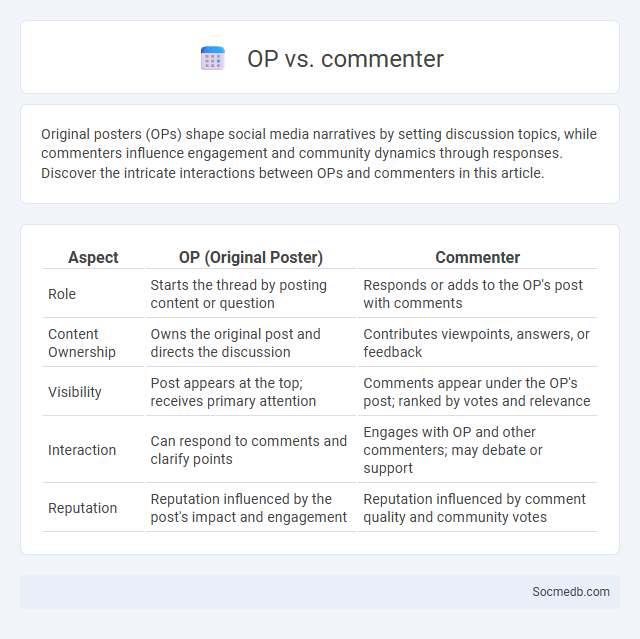
Photo illustration: OP vs Commenter
Original posters (OPs) shape social media narratives by setting discussion topics, while commenters influence engagement and community dynamics through responses. Discover the intricate interactions between OPs and commenters in this article.
Table of Comparison
| Aspect | OP (Original Poster) | Commenter |
|---|---|---|
| Role | Starts the thread by posting content or question | Responds or adds to the OP's post with comments |
| Content Ownership | Owns the original post and directs the discussion | Contributes viewpoints, answers, or feedback |
| Visibility | Post appears at the top; receives primary attention | Comments appear under the OP's post; ranked by votes and relevance |
| Interaction | Can respond to comments and clarify points | Engages with OP and other commenters; may debate or support |
| Reputation | Reputation influenced by the post's impact and engagement | Reputation influenced by comment quality and community votes |
Understanding the Roles: OP and Commenter
The original poster (OP) initiates the conversation by sharing content or posing questions, setting the tone and context for community interaction. Commenters respond by offering feedback, opinions, or additional information, contributing to the depth and diversity of the dialogue. Effective social media engagement hinges on the dynamic interplay between OP's content and commenters' reactions, fostering meaningful discussions and audience connection.
What Does "OP" Mean in Online Discussions?
OP" stands for "Original Poster" in online discussions, referring to the person who started the thread or posted the initial comment. Understanding this term helps you follow conversations more clearly by identifying whose perspective or question is being addressed. Recognizing "OP" ensures more accurate and context-aware responses in social media interactions.
The Commenter: Voice of the Community
The commenter acts as the voice of the community, shaping conversations and influencing opinions across social media platforms. Through authentic engagement and thoughtful feedback, commenters foster a dynamic exchange that drives brand trust and user interaction. Platforms like Instagram, Twitter, and Facebook thrive on this participatory culture, highlighting the importance of meaningful dialogue to sustain active online communities.
How OP and Commenters Interact
Social media platforms facilitate dynamic interactions between original posters (OPs) and commenters, where OPs often initiate conversations by sharing content or opinions. Commenters engage by providing feedback, asking questions, or expressing agreement or disagreement, creating a layered dialogue that enhances community engagement. This interactive exchange is driven by features such as likes, replies, and threaded comments that foster continuous communication and relationship building.
Common Misunderstandings: OP vs Commenter
Many users confuse the Original Poster (OP) with commenters, assuming the OP is responsible for all thread content, which overlooks the distinct roles each plays in shaping discussions. Understanding that commenters contribute individual perspectives while the OP initiates the topic enhances your ability to navigate social media interactions thoughtfully. Clear differentiation between OP and commenters improves your interpretation of online conversations and reduces miscommunication.
The Importance of OP Replies to Comments
OP replies to comments play a critical role in enhancing user engagement and fostering a sense of community on social media platforms. Responding to comments encourages meaningful interactions, increases post visibility through algorithmic boosts, and builds trust between content creators and their audience. Regular OP engagement signals authenticity and responsiveness, which can significantly improve follower retention and brand loyalty.
Strategies for Effective OP-Commenter Engagement
Using targeted strategies to engage OP-commenters increases interaction quality and fosters community loyalty on social media platforms. Responding promptly with personalized replies, asking open-ended questions, and incorporating relevant hashtags enhances visibility and encourages meaningful dialogue. Monitoring sentiment through analytics tools helps refine engagement tactics, ensuring conversations remain positive and aligned with brand values.
Escalations: When OP Responds Back to the Commenter
Escalations on social media often occur when the original poster (OP) responds back to a commenter, potentially intensifying conflict. Your timely and thoughtful reply can either de-escalate tensions or provoke further negative interactions, affecting your online reputation. Employing clear communication and positive language is essential to manage escalations effectively and maintain constructive engagement.
Examples: Classic OP vs Commenter Exchanges
Classic original posts (OP) on social media platforms like Twitter and Reddit often spark extensive commenter exchanges, where users engage in debates, provide feedback, or share related experiences. These interactions enhance content visibility through algorithmic boosts driven by user engagement metrics such as likes, replies, and shares. Understanding the dynamics between OPs and commenters is crucial for optimizing content reach and fostering vibrant online communities.
Best Practices for Respectful OP and Commenter Interactions
Engaging respectfully on social media involves prioritizing clear communication, active listening, and empathy between original posters (OPs) and commenters. Best practices include acknowledging diverse perspectives, maintaining a polite tone, and avoiding inflammatory language to foster constructive conversations. Encouraging thoughtful dialogue and promptly addressing misunderstandings help create a positive online community environment.
 socmedb.com
socmedb.com